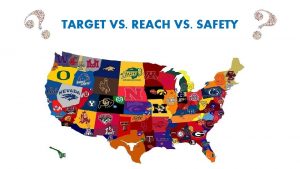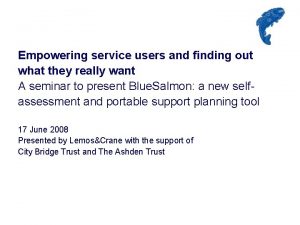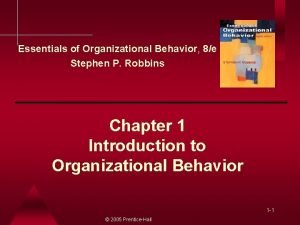Communities In Schools of Delaware Empowering students to











- Slides: 11

Communities In Schools of Delaware Empowering students to stay in school and achieve in life

The CIS Model of Integrated Student Services 2

Integrated Student Services: A Critical Element of Successful Public Education In the classroom Education Management Successful Public Education Integrated Student Services 3

Communities In Schools Plays a Vital Role in Empowering Students National Indicators of Academic Achievement and Youth Success Early Childhood Health Care Access, Preschool Enrollment Grades K-5 4 th Grade Reading, Common Core Standards Grades 6 -8 Transition Support, 8 th Grade Math & Science, Out-Of -School Time Participation Grades 9 - 12 Higher Education & Certification Transition Support, Promotion from 9 th to 10 th Grade, High School Graduation, Youth Service Minimum 2 Years Postsecondary, Youth Service Employment Communities In Schools Impact Grad Nation Continuum Communities In Schools has proven results in 4 th and 8 th grade math and reading scores, promotion, high school graduation, and keeping kids in school. Affiliates across the country also support students throughout the cradle to career pipeline. 4

CIS Network Theory of Change Supports And Convenes Key Stakeholders (Power, Authority, Community) CIS Network Coordinate services and resources in public school setting guided by the “Five Basics” Sustainable nonprofit organizations with expertise in providing integrated students support services 5 Evidence-Based Integrated Student Services based on assessed student and school needs Strategy Widely accessible prevention and intervention services Positive outcomes for school Permanent institutional change The CIS Model Appropriately balanced and integrated for maximum effectiveness Targeted and sustained individual student interventions CIS Model Positive student outcomes Outcomes Significant reduction in dropout rates Impact

Students Served by CIS of Delaware CISDE Students • • • Trends in Level 2 Service Provision 10, 000 students • 7, 500 Level I • 960 Level II 84% racial minorities More than 60% Free and Reduced Lunch Racial Breakdown of CISDE Students 4. 0% Hispanic 21. 0% White 59. 0% 16. 0% African American Other Pregnant/Parenting 2% Poor Attendance 32% Low SES 54% Academic Concerns 57% Low Expectations 40% Low Student Effort 44% Family Disruption 57% Emotional Disturbance 17% Misbehavior 41% 0% 20% 40% 6

CIS Brokered and Provided Services Service Summary, by Hours Basic Needs 278 Professional Health 482 Family Engagement 868 Academic Assistance 965 Community Involvement Behavioral Intervention College/Career Prep 1409 2014 3121 Life Skills 7609 Enrichment 7810 0 200040006000800010000 7

CIS is Proven Successful STUDENT GOAL IMPROVEMENTS • 70% met attendance goals • 80% met behavior improvement goals • 70% met academic improvement goals • 86% met improvement in educational commitment goals STUDENT IMPROVEMENTS • • 85% were promoted to the next grade 99% Stayed in School 96% of seniors graduated 81% of seniors went on to postsecondary education COMMUNITY INVOLVEMENT • 75 Community Partners • 605 Volunteers • 7, 995 Volunteer Hours 2012 -2013 End of the Year Report 8

The Impact of CIS of DE: The Results CIS Is a Uniquely Beneficial Investment • The present net value of Communities in Schools of DE is $20, 562, 089. • The average annual rate of return to society is 19. 6%. Imagine earning this kind of return on your personal savings account! 9 • The benefit cost (B/C) ratio is 12. 5, meaning that every $1 invested in CIS of DE creates $12. 50 of economic benefit for the community. • Graduates will, on average, have returned the investment made in them by the time they are 26 years old, and will be net contributors to the economy for the rest of their working lives.

History of Public & Private Support Delaware General Assembly Grant In Aid 10

The Big Picture Community and Partnership Resource Development Marketing and Public Relations • Operating in 3 counties • CISDE generated $1. 6 million dollars in support from public and private sector • Return on Investment study yielded very positive results • 2 affiliates (Wilmington, State of Delaware) • 7 school districts • 14 Schools • 75 partners • 605 volunteers served 7, 995 hours (valued over $200, 000) • 17 full time employed and repositioned staff • 5 Ameri. Corps and Public Allies • OJJDP Federal Grant 11 • AT&T Aspire Reward of $300, 000 to go deeper in our work • CIS listed in Chronicle of Philanthropy’s “Social Impact 100 Index” • Joint Americorp grant with Connecting Generations to support School mentoring Managing and Developing CIS Sites • Served 14 Schools: • 2 elementary schools • 2 middle schools • 6 high schools • 2 combined schools • 2 Afterschool Programs Providing / Brokering Quality Youth Programming Service • Access to 10, 000 students 960 of these with intensive supports) • Engaged 900 parents and guardians • Service Learning • Mentoring • College Readiness • Life Skills • Basic Needs • Physical and Mental Health Data Collection, Evaluation and Reporting 96% of monitored seniors graduated Of 960 students monitored: • 99% stayed in school • 70% increased academically • 80% were promoted to the next grade • 80% behaved better after services • 70% met attendance goals • 86% met Attitude commitment goals
 Hydrarch type of succession does not start on
Hydrarch type of succession does not start on Coalition for community schools
Coalition for community schools Powerschool huntsville
Powerschool huntsville Safety target reach schools
Safety target reach schools Empowering business
Empowering business Empowering youth quotes
Empowering youth quotes Empowering service users
Empowering service users Empowering and delegating
Empowering and delegating Empowering imagination
Empowering imagination Empowering people in ob
Empowering people in ob Writers notebook examples
Writers notebook examples Acer empowering people
Acer empowering people





















